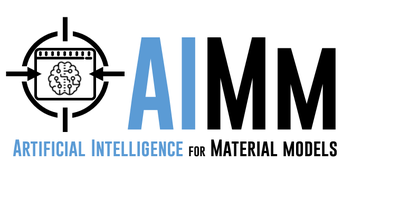Artificial Intelligence for Material Models (AIMM)
Watch the handover of the funding decision for the research project on AI in the field of materials modeling with Federal Minister of Economics Peter Altmaier live here.
For the development of future, efficiency-optimized and low-emission vehicle concepts, the deployment of reliable and precise simulation methods is of fundamental importance. The objective of the Artificial Intelligence for Material Models (AIMM) research project is to complement and/or replace the classical model-based material characterization with an alternative, data-driven material modeling. Particularly in the context of the use of new materials, whose behavior is getting increasingly more complex, this is intended to overcome the limits of conventional material characterization. The focus in AIMM will be on faster deployment of new materials through accelerated description for CAE applications, the development of associated new experimental concepts to generate the necessary training data, and the shortening of the characterization and modeling phase through automation of the processes.

DYNAmore, with its expertise in the simulation of dynamic tasks in structural mechanics, will be strongly involved in the project administered by the project sponsor TÜV Rheinland, especially with the Material Competence Center (MCC). Other industrial consortium partners are Mercedes-Benz AG, ElringKlinger AG, GOM GmbH and renumics GmbH. On the part of the research institutions, the Ernst-Mach-Institut of the Fraunhofer Gesellschaft, the Institute for Software Engineering and Theoretical Computer Science (IDA) of the Technical University of Berlin, as well as the University of Stuttgart with the Institutes for Aircraft Design and Forming Technology are participating in the project, which is funded with 2.9 million EUR by the Federal Ministry for Economic Affairs and Energy (BMWi) based on a resolution of the German Bundestag.
Professor André Haufe, head of the DYNAmore MCC, comments: "There are numerous possibilities to support, optimize or even replace CAE processes by methods of Artificial Intelligence. As experts in materials characterization, we see new and exciting challenges in this area. The project partners in AIMM are excellently positioned to solve these challenges. A significant project risk is the fact that an industrial application places significantly higher demands on robust implementation, both on the data side for obtaining training data and on the evaluation side. Thus, we are eagerly awaiting the start of the project and look forward to an intensive and productive collaboration."